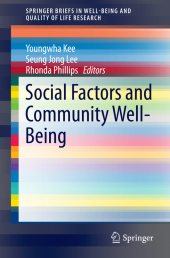 Neuerscheinungen 2016Stand: 2020-02-01 |
Schnellsuche
ISBN/Stichwort/Autor
|
Herderstraße 10
10625 Berlin
Tel.: 030 315 714 16
Fax 030 315 714 14
info@buchspektrum.de |

Youngwha Kee, Seung Jong Lee, Rhonda Phillips
(Beteiligte)
Social Factors and Community Well-Being
Herausgegeben von Kee, Youngwha; Lee, Seung Jong; Phillips, Rhonda
1st ed. 2016. 2016. xv, 99 S. 9 SW-Abb. 235 mm
Verlag/Jahr: SPRINGER, BERLIN; SPRINGER INTERNATIONAL PUBLISHING 2016
ISBN: 3-319-29940-9 (3319299409)
Neue ISBN: 978-3-319-29940-2 (9783319299402)
Preis und Lieferzeit: Bitte klicken
This book explores social factors that influence well-being, as well as the relationship between these factors. It examines individual areas of social policy from the perspective of children´s well-being, gender equity, and the impact of crime and social capital. The book discusses the relationships of well-being with the provision of public services, with developing a sense of community, and dimensions of happiness in nations. Bringing together perspectives from around the globe, the book provides both theoretical and applied explorations. It links the idea of influencing social factors and outcomes to community well-being, thus adding a new perspective. In doing so, it reflects the new and exciting research that is being conducted at the intersection between social factors, policy, impacts, and community well-being.
Preface.- Chapter 1. Conceptualizing a Community Well-Being and Theory Construct; Heekyung Sung and Rhonda Phillips.- Chapter 2. An Exploratory Study of the Relationship between Community Well-being, Individual Well-being, and Local Public Services; Seung Jong Lee and Yunji Kim.- Chapter 3. Does Sense of Community Really Matter in Community Wellbeing?; Youngwha Kee and Chaebong Nam.- Chapter 4. The Development and Production of Local, National, and international State of Children´s Wellbeing Report Cards; Geoff Woolcock and Jeanette Pope.- Chapter 5. An Exploration of the Relationship Between Gender Equity and Community Wellbeing; Sharan Merriam.- Chapter 6. Crime and Community Wellbeing: The Role of Social Capital and Collective Efficacy in Increasing Safety; David Sloane.- Chapter 7. Relationships between Social Policy Factors and National Competitiveness and Happiness; Young-Chool Choi and Ji-Hyun Jang.
"This book fulfills the purpose of spurring the need for more research on the subject of social factors and their impact on community well-being. ... the book is definitely a step towards operationalizing the fluid concept of community well-being by the use of theories such as social capital, human capital, needs theory, and community development. The book should have a wide appeal to researchers, and graduate and undergraduate students in the field of community studies." (Karim W. F. Youssef, Journal of Community Safety & Well-Being, Vol. 1 (3), November, 2016)
Youngwha Kee is a professor of the Department of Lifelong Education at Soongsil 156 University and the president of the National Institute of Lifelong Education. She 157 currently serves as the director of the Korea Institute of Local Development 158 Education. Previously, Dr. Kee was president of the Association of Adult and 159 Continuing Education of Korea and researcher of Korea Association for Commu- 160 nity Education. She has served on several advisory committees in relation to 161 educational policies and has been deeply involved with community education 162 among multicultural families and education for the disadvantaged. She serves on 163 the editorial board of the International Journal of Continuing Education and Life- 164 long Learning (Hong Kong) ) and the Lifelong Education Magazine (Taiwan). Her research interests include older adult learning, community education, civic education, and community development.


